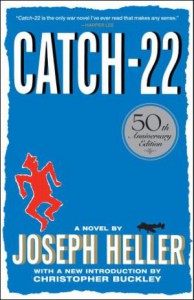Words, Words, Words
A catalog of my comments and thoughts on books, reading, and writing as well as anything I come across that seems interesting. I used to sell other people's words at an independent bookstore but now I hope to get by on selling my own.
But there's a catch...

By the time of your reading this in the twenty-first century, absudity has been well established in our dealings with society. A bill on background checks was recently defeated in the Senate despite receiving the majority of votes, the DMV requires you to bring three different documents to prove to them that you are, in fact, you, Baz Luhrmann is being allowed to remix and destroy another classic piece of literature, and most of us know more about the personl life of Miley Cyrus than we do some of oour closest friends. Yet it has become so old hat that we tend to let it spiral on without much of a second thought. That is until throws it in our face, someone like Joseph Heller.
It is easy to see the web of influence that Catch-22 has spun since it was released in 1962. MASH, The Daily Show with John Stewart, The Colbert Report, The Onion, et cetera, et cetera. They, like Heller's hilarious novel, are the child in The Emperor's New Clothes, letting us know, that no it's not just you, this place is nuts!
The dialogue follows a lot from the likes of the Marx Brothers, it goes around in circles, when one party has forwarded the topic, the other has circled back and they never get to the same page. Even if they do, they find that none of it makes any sense. Everything is, in fact its own opposite. You have to see the doctor to be deemed unfit and taken from combat duty, but going to the doctor proves that you are fit for combat. The only way to succeed is to fail, the only way to fail is to succeed, and once yo uthink you have something figured out, you find there is a catch. Catch-22.
In the characters we find some consistancy, Yossarian is the hero, he is crazy, sure but he is one of only a few that still finds value in human life-especially in his own. The Colonels and Generals are dispicable or incompetant, or both. Mostly both. Yet, they have a point as well. After all, when the chaplain prays that the missing plane returning from a run does not contain Yossarian, he realizes that he is praying-implicitley-for the death of another bombadier that he has never even meant. As much is proposed when he suggests to his superiors that the lives of several of the old crew members would have been saved if the ceiling for combat flights had not again been raised, but is countered with the statement, that another fresh crew would have fallen in their stead.
It brings us to the great unstated theme, the ultimate Catch-22; war is an inherantly wrong and absurd act, if the very premise is wrong, can anyone be right? Do the lives of the allied troops spared by bombing that mountain town balance the civilian lives taken? Is it better to keep bomber crews around so long that their survival rate approaches zero or to rotate more crews and more men and expose them all to the danger? Was the Chaplain given that tomato or did he steal it? There are no right answers...except that last one, he was given it.
There is a lot more to it as well. Inside the big question are little ones, on the nature of command and religion, on modern capitalism and the treatment of women in war zones-a tragically underreported issue that continues today. Milo, the blackmarket capitalist of the sleaziest order, gets a surprising share of pages that track his various wheelings and dealings, buyings and sellings. A nonsensical chain of transactions that seem to mostly happen within the realm of his "syndicate" which eventually comes to include all the dealers, most towns, all his buyers and every side of the war except the Russians. His is the only part I felt sometimes to be at all tedious but then it finds it's way into such wonderful twists and great punchlines ("But you gave them chocolate covered cotton") that it pays off.
I'd like to make special mention of one of my favorite characters ex P.F.C. Wintergreen. He is a genious combination of straight man and trickster. He is the only one who seems to have a handle on the absurdity-Milo succeeds in it but doesn't understand that it is absurd, Yossarian has come to see that it is absurd but cannot follow its twists and turns. Wintergreen sees it all and plays the characters against each other, twisting their arguements and spiting it back at them or down the line in a new form altogether. He is the model of so many leading comedy characters of the last 50 years: Hawkeye from MASH, Jim from The Office, Chevy Chase in Caddyshack, Bill Murray. He conducts the orchestra of comedy, sending lunatic commanders crashing into each other and causing a cacaophany of confusion and chaos.
Of course, it is Yossarian that is the hero. It is Yossarian that recognizes how wrong the world around him has become. Even if much of his worry seems selfish, it upholds the idea that life is precious while others act as if it is disposible. They dance around the edge of death without care, whether it's Aarfy heartlessly puffing his pipe by his injured friend or McWatt's dangerous flight stunts, Milo's profiteering or the order to bomb a civilian town. The big question of is there a right answer in war? There is an answer. Yossarian Lives!
 1
1
